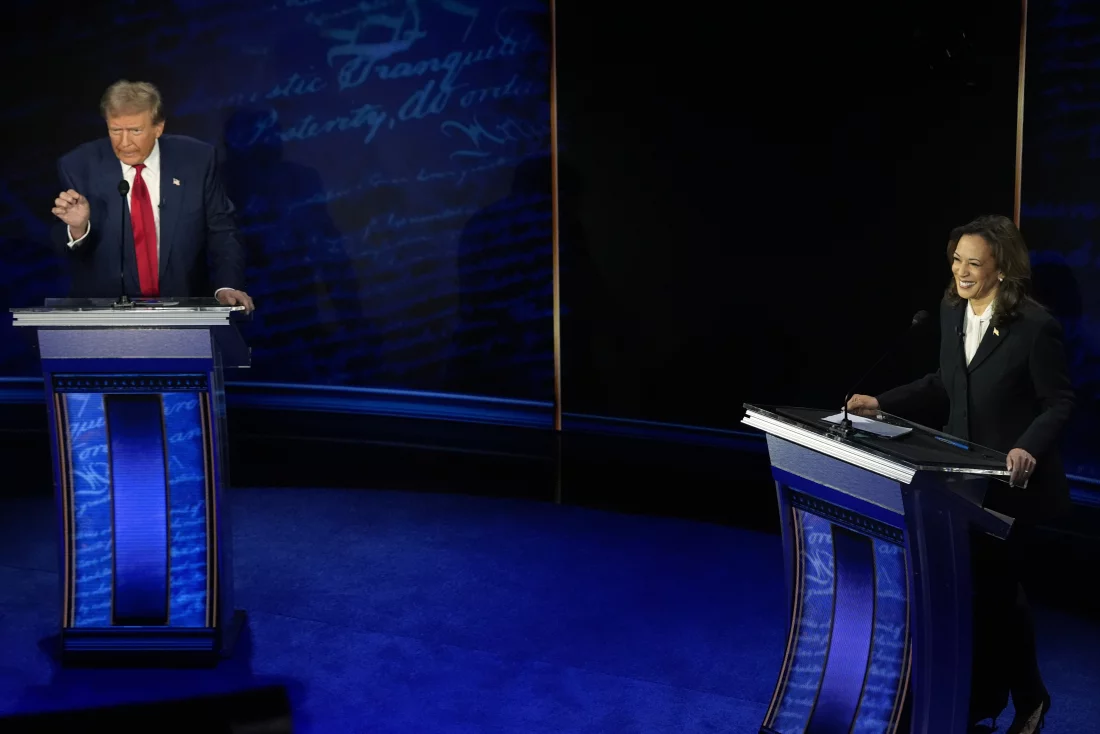
- Details
- By Levi Rickert and Neely Bardwell
Native Vote 2024. Vice President Kamala Harris (Democrat) and former President Donald Trump (Republican) faced off on Tuesday night in Philadelphia in what turned into a fiery presidential debate.
It was the first in-person meeting between the two presidential candidates.
The ABC News debate did not have a live audience in the auditorium, but was watched by an estimated 67.1 million aired across 17 stations, according to Neilsen, a media ratings company.
Trump, who is making his third run for the presidency and having participated in seven previous presidential debates, came into the debate as being more experienced than Harris.
However, it did not take Harris long to prove herself to be a formidable debater soon after the debate began. Harris spent the majority of the debate looking directly at her opponent or talking directly to the audience, often smirking, laughing out loud, or shaking her head incredulously while he answered questions.
The split screen showed Trump staring straight ahead almost the entire debate, occasionally shaking his head in response to something Harris said. Both candidates tried to speak over each other several times throughout the debate.
Topics ranged from the economy, a woman’s right to choose, immigration, and climate change.
Trump argued that the Biden-Harris administration had “destroyed” the country, and continued with labeling her a "Marxist", referencing her father, a professor of economics. Calling back to Harris’ 2020 vice-presidential debate against Mike Pence, Trump at one point after she tried to interrupt him said "I'm talking now. Does that sound familiar?" Trump also blamed Democratic rhetoric for the assassination attempt against him in July.
“I probably took a bullet to the head because of the things they said about me. They talk about democracy. I’m ‘a threat to democracy.’ They’re the threat to democracy.” he said.
Later, Trump referred to unsubstantiated claims - repeated by J.D. Vance, Trump's running mate, said that Haitian migrants in Springfield, Ohio, had been stealing pets and eating them. City officials said there is no evidence to support the merit of these claims.
"They're eating the dogs, they're eating the cats, they're eating the pets of the people that live there. This is a shame," he said.
"Talk about extreme," Harris said in response.
Both candidates had an opportunity to discuss access to abortion and the overturning of Roe v. Wade, something Trump often boasts as his doing. Trump continued the narrative that the issue is with the states, and when asked if he would sign or veto a federal abortion ban bill, he would not answer. Instead, saying “I wouldn’t have to,” he said. “They can never get this approved.”
“One does not have to abandon their faith or deeply held beliefs to agree the government - and Donald Trump, certainly - should not be telling a woman what to do with her body,” Harris said on the matter. “Pregnant women who want to carry a pregnancy to term, suffering from a miscarriage, being denied care in an emergency room because their healthcare providers are afraid they might go to jail and she's bleeding out in a car in the parking lot. She didn't want that. Her husband didn't want that. A 12 or 13-year-old survivor of incest being forced to carry a pregnancy to term. They don’t want that.”
Moderated by ABC’s David Muir and Linsey Davis, the debate lasted nearly one hour and 45 minutes.
Help us tell the stories that could save Native languages and food traditions
At a critical moment for Indian Country, Native News Online is embarking on our most ambitious reporting project yet: "Cultivating Culture," a three-year investigation into two forces shaping Native community survival—food sovereignty and language revitalization.
The devastating impact of COVID-19 accelerated the loss of Native elders and with them, irreplaceable cultural knowledge. Yet across tribal communities, innovative leaders are fighting back, reclaiming traditional food systems and breathing new life into Native languages. These aren't just cultural preservation efforts—they're powerful pathways to community health, healing, and resilience.
Our dedicated reporting team will spend three years documenting these stories through on-the-ground reporting in 18 tribal communities, producing over 200 in-depth stories, 18 podcast episodes, and multimedia content that amplifies Indigenous voices. We'll show policymakers, funders, and allies how cultural restoration directly impacts physical and mental wellness while celebrating successful models of sovereignty and self-determination.
This isn't corporate media parachuting into Indian Country for a quick story. This is sustained, relationship-based journalism by Native reporters who understand these communities. It's "Warrior Journalism"—fearless reporting that serves the 5.5 million readers who depend on us for news that mainstream media often ignores.
We need your help right now. While we've secured partial funding, we're still $450,000 short of our three-year budget. Our immediate goal is $25,000 this month to keep this critical work moving forward—funding reporter salaries, travel to remote communities, photography, and the deep reporting these stories deserve.
Every dollar directly supports Indigenous journalists telling Indigenous stories. Whether it's $5 or $50, your contribution ensures these vital narratives of resilience, innovation, and hope don't disappear into silence.
 The stakes couldn't be higher. Native languages are being lost at an alarming rate. Food insecurity plagues many tribal communities. But solutions are emerging, and these stories need to be told.
The stakes couldn't be higher. Native languages are being lost at an alarming rate. Food insecurity plagues many tribal communities. But solutions are emerging, and these stories need to be told.
Support independent Native journalism. Fund the stories that matter.
Levi Rickert (Potawatomi), Editor & Publisher
